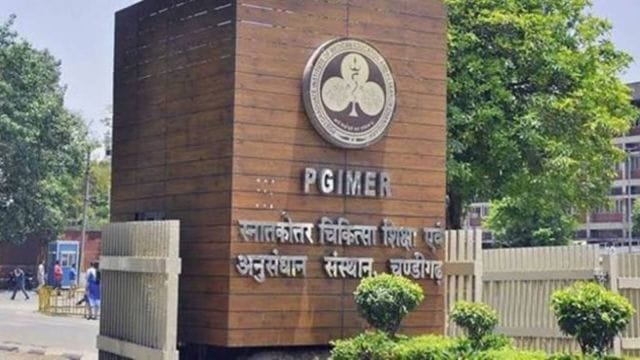‘Larger idea is how to identify cancer without biopsy’: PGIMER
This research has received funding of Rs 90 lakh from the Indian Council of Medical Research (ICMR) and the study is being led by Dr Bakshi, and the team, including Dr Banumathy.
 A detailed account of the incident was shared, and the PGIMER Director assured that firm and swift action would be taken against the culprits, with a personal commitment to follow up until justice is served.
(File Photo)
A detailed account of the incident was shared, and the PGIMER Director assured that firm and swift action would be taken against the culprits, with a personal commitment to follow up until justice is served.
(File Photo)A healthy voice is imperative for effective communication. In India, 8 per cent of the population suffers from voice disorders like a change in voice to complete inability to speak. It could be either functional or organic. A voice disorder exists when a person’s quality, pitch, and loudness differ from those of a similar age, gender, cultural background, and geographic location. Patients should be concerned when there is a persistent vocal quality change, including breathiness, hoarseness or complete loss of voice. Other symptoms also include a persistent funny feeling or pain in the larynx, a persistent feeling that the voice is stuck in the throat, vocal fatigue and persistent pitch breaks. PGIMER caters to the medical needs of patients from almost five states of Northern India.
Dr Jaimanti Bakshi, Prof and Head, Department of Otolaryngology, Head and Neck Surgery, PGI, says the number of patients visiting the ENT OPD at PGI is on average 900 per day with various ENT ailments, out of whom eight to 10 patients per day are diagnosed with voice disorders.
The total number of patients with voice disorders has increased over time, probably due to the changing lifestyles. “Most of the voice disorders are preventable. There are many ways in which people can conserve their voice and prevent the development of voice disorders, including avoiding overuse of voice, keeping hydrated by sipping unrefrigerated water every one hour, minimising activities causing vocal strain such as yelling, talking for long hours on the telephone, speaking less, avoiding excessive throat clearing, warming up before heavy vocal use, using appropriate breath support, using amplification, for professional voice users like singers and teachers and paying attention to voice cues. Whenever a person feels a difference in his voice quality, following any episode of illness, allergies, gastro-esophageal reflux disorder, laryngo-pharyngeal reflux, and thyroid problems, precautionary measures must be taken to prevent further deterioration of voice quality,” says Dr Bakshi.
Dr Banumathy N, Associate Professor at Speech and Hearing Unit, PGI, suggests that “we must project the voice at a comfortable pitch and loudness level, meanwhile allowing several periods of voice rest during the day”. “Restrict ingestion of caffeine, carbonated drinks, alcohol, smoking and tobacco as these have detrimental effects on voice quality, as does very spicy food, pollution, heat, and dryness. Avoid any kind of vocalisation while lifting any heavy weight. Refrain from speaking in noisy areas. On seeing any signs of vocal fatigue, immediately consult an otolaryngologist and speech language pathologist,” says Dr Banumathy.
The department is conducting a research study that aims to identify the risk of vocal cord cancer (laryngeal cancer) through changes in human voice patterns. Using Artificial Intelligence (AI), this study will help predict whether a person is at risk of developing vocal cord cancer in the future by collecting voice data. This research has received funding of Rs 90 lakh from the Indian Council of Medical Research (ICMR) and the study is being led by Dr Bakshi, and the team, including Dr Banumathy. Early diagnosis is the key, and PGI’s study could prove to be a breakthrough in the prevention of cancer. The study will collect voice data from more than 1,000 individuals above 18 divided into two groups – one consisting of healthy individuals and the other of those already suffering from some kind of voice disorders.
“The larger idea is how to identify cancer without biopsy. The voice of participants will be recorded through a specially designed mobile app. These recordings will then be analysed using AI, which will identify specific patterns in the voice that may indicate a future risk of vocal cord cancer. As more data is collected, the accuracy of the AI system is expected to improve. This data will also help in detecting other voice disorders in the future.” says Dr Bakshi.







